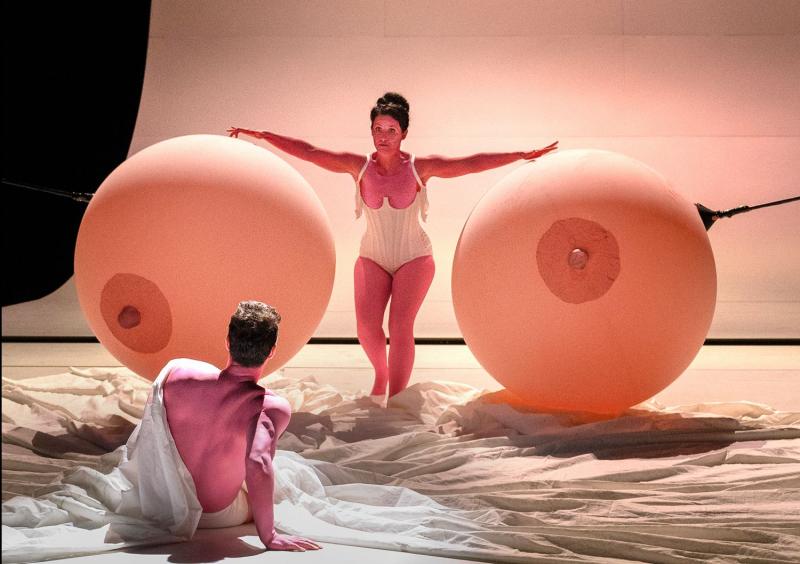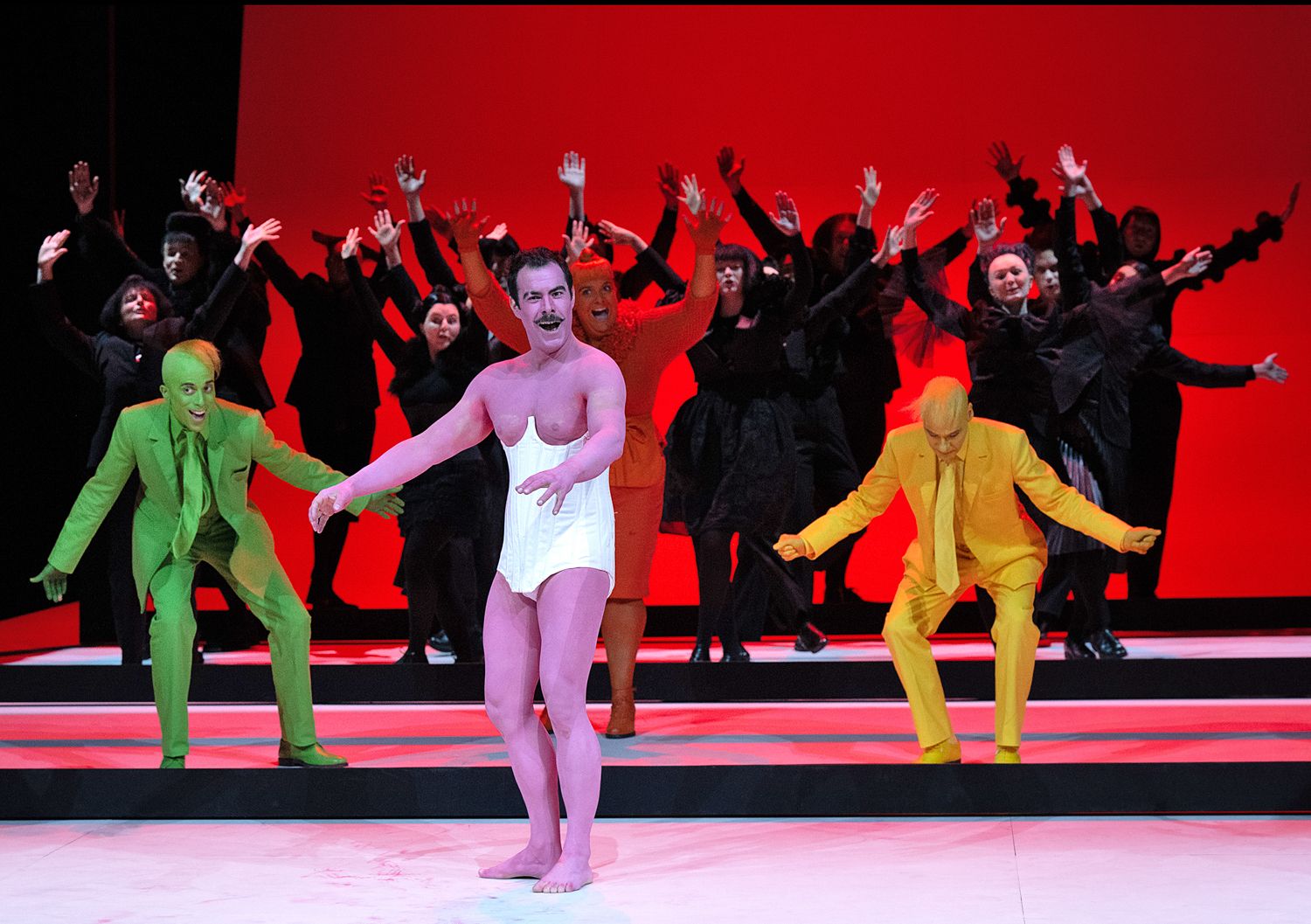La Voix humaine/Les Mamelles de Tirésias, Glyndebourne review - phantasmagorical wonders | reviews, news & interviews
La Voix humaine/Les Mamelles de Tirésias, Glyndebourne review - phantasmagorical wonders
La Voix humaine/Les Mamelles de Tirésias, Glyndebourne review - phantasmagorical wonders
Visual and aural beauty, strong performances, in a stunning double-bill from Laurent Pelly

“Variety is the spice of life! Vive la difference!,” chirrups the ensemble at the end of this giddying double bill. And there could hardly be more singular variety acts than a potential suicide at the end of a phone line, a woman who lets her breasts fly away and grows a beard, and a husband who breeds 40,049 children on his own.
Favourite Glyndebourne Director Laurent Pelly has gift-wrapped Poulenc’s two one-act one-offs with intelligence, verve and visual brilliance - which in the first case means semi-darkness, in the second all the colours of the rainbow - and conductor Robin Ticciati draws every possible colour from the London Philharmonic Orchestra to complement an unforgettable vision. I doubt if Glyndebourne punters could ever have had a better time, the house’s trademark Mozartian comedy notwithstanding.  First, though, there has to be deep unease. “Elle”, the only singer we hear in La Voix humaine, is far too ambivalent a figure to move us to tears, at least in this very singular take. How manipulative is she, really, with the man on the other end of the line whose responses we can’t hear, and can’t always guess? The opening tableau of a woman with a mass of hair, face invisible to us, collapsed on a rectangular stage in the dark, could be showing us Mélisande by the pool in Maeterlinck/Debussy's symbolic forest. Then, as “Elle” raises her head, we see the other “character”, the telephone itself. The context remains mythical, a fierce Greek tragic heroine caged within a modern woman trying to be sensible.
First, though, there has to be deep unease. “Elle”, the only singer we hear in La Voix humaine, is far too ambivalent a figure to move us to tears, at least in this very singular take. How manipulative is she, really, with the man on the other end of the line whose responses we can’t hear, and can’t always guess? The opening tableau of a woman with a mass of hair, face invisible to us, collapsed on a rectangular stage in the dark, could be showing us Mélisande by the pool in Maeterlinck/Debussy's symbolic forest. Then, as “Elle” raises her head, we see the other “character”, the telephone itself. The context remains mythical, a fierce Greek tragic heroine caged within a modern woman trying to be sensible.
Stéphanie d'Oustrac - Poulenc's great-grandniece, incidentally, though she won her Glyndebourne laurels way back as Carmen - acts as remarkably and responds as variously as anyone I’ve seen performing the original 1930 Cocteau play, though the middle-range parlando doesn't project as clearly, paradoxically, from a mezzo as it would, in most cases, from a soprano. The outbursts, when they come, are big, powerful and eventually lacerating. A Rothkoesque red-to-orange line glows against the black occasionally; the stage picture widens or narrows with reminiscences and emotional shut-downs. The drama raises more questions than answers, but the anchoring comes from the most beautiful of the hushed divided string chords and sequences, as perfectly placed as the silences in Ticciati’s mastery of pace and nuance.  One of the fascinations here is how those chordal mysteries invade the supposedly comic-surreal world of Les Mamelles de Tirésias. This is less about sombre concentration than quick-change artistry; Poulenc runs a gamut as sure as Stravinsky’s, from boulevard numbers to operetta prettiness, mock-sombre chorales to skittish patter. Ticciati, Pelly, set designer Caroline Ginet and lighting artist Urs Schonebaum seem to get everything right; the visual as well as the aural beauty is important, starting with the bluish-white sweep in which the Theatre Director takes Elle’s place in a very different context.
One of the fascinations here is how those chordal mysteries invade the supposedly comic-surreal world of Les Mamelles de Tirésias. This is less about sombre concentration than quick-change artistry; Poulenc runs a gamut as sure as Stravinsky’s, from boulevard numbers to operetta prettiness, mock-sombre chorales to skittish patter. Ticciati, Pelly, set designer Caroline Ginet and lighting artist Urs Schonebaum seem to get everything right; the visual as well as the aural beauty is important, starting with the bluish-white sweep in which the Theatre Director takes Elle’s place in a very different context.
Do we get the po-faced moralizing about making babies, not war, he promises? Far from it. There could be no better satyr-play to upend the moral-majority platitudes of Strauss and Hofmannsthal's fertility drama Die Frau ohne Schatten (at a stretch, you could describe the longed-for childbirths there as symbols of creativity), Apollinaire’s crazy text is absolutely non-judgmental about women becoming men, men women, they/theirs, means of reproduction, very unsentimental education, brawls that dissolve, a chorus which never gets to hold its social moral-majority position for long. The visual gags rise to the silly sublimitiy of it all: even the Husband corseted isn’t allowed to go in for cheap camp – what a glowing performance this is from Régis Mengus, vocally a gorgeous baritonal match for Gyula Orendt’s Director/Policeman.  Ensemble is all in this piece, something at which Glyndebourne excels, with its brilliant young chorus members who can also be called upon to take the smaller roles. Even so, there's a big solo for our heroine-into-hero, and while you might not pick out Elsa Benoit's light soprano as exceptional, she too provides the full music-theatre deal.
Ensemble is all in this piece, something at which Glyndebourne excels, with its brilliant young chorus members who can also be called upon to take the smaller roles. Even so, there's a big solo for our heroine-into-hero, and while you might not pick out Elsa Benoit's light soprano as exceptional, she too provides the full music-theatre deal.
As the voyage into absurdity sails on, we meet a bickering (gay?) couple, Presto and Lacouf (Christophe Gay and François Piolino, game for anything and splendidly colour-coded; pictured above with Mengus and the chorus); the amorous Policeman; a precocious brat who sounds like an informer, Pavlik Morozov style in the making (delicious cameo from James Way, whose last solo appearance at Glyndebourne was as a real boy); an odd reporter (Loic Félix); and those 40,049 babies the Husband has procreated by himself. The look of that is a bit of a spoiler if you're going to see the operas - it got a big round of applause - but why waste a good photo?  The Poulenc/Apollinaire wonderland almost outstays its welcome, but just when you could do with less brittleness, Thérèse restored to her original self sings a gorgeous opéra comique ditty which proves that to parody, you need to love what you're spoofing. And love is in every pore of Poulenc's music, as well as in Glyndebourne's final triumph of a magnificent season. What bliss to know that the full-length Poulenc opera, one of the most profound of the 20th century, Dialogues des Carmélites, with Ticciati again conducting, awaits us in 2023.
The Poulenc/Apollinaire wonderland almost outstays its welcome, but just when you could do with less brittleness, Thérèse restored to her original self sings a gorgeous opéra comique ditty which proves that to parody, you need to love what you're spoofing. And love is in every pore of Poulenc's music, as well as in Glyndebourne's final triumph of a magnificent season. What bliss to know that the full-length Poulenc opera, one of the most profound of the 20th century, Dialogues des Carmélites, with Ticciati again conducting, awaits us in 2023.
rating
Explore topics
Share this article
The future of Arts Journalism
You can stop theartsdesk.com closing!
We urgently need financing to survive. Our fundraising drive has thus far raised £49,000 but we need to reach £100,000 or we will be forced to close. Please contribute here: https://gofund.me/c3f6033d
And if you can forward this information to anyone who might assist, we’d be grateful.

Subscribe to theartsdesk.com
Thank you for continuing to read our work on theartsdesk.com. For unlimited access to every article in its entirety, including our archive of more than 15,000 pieces, we're asking for £5 per month or £40 per year. We feel it's a very good deal, and hope you do too.
To take a subscription now simply click here.
And if you're looking for that extra gift for a friend or family member, why not treat them to a theartsdesk.com gift subscription?
more Opera
 La bohème, Opera North review - still young at 32
Love and separation, ecstasy and heartbreak, in masterfully updated Puccini
La bohème, Opera North review - still young at 32
Love and separation, ecstasy and heartbreak, in masterfully updated Puccini
 Albert Herring, English National Opera review - a great comedy with depths fully realised
Britten’s delight was never made for the Coliseum, but it works on its first outing there
Albert Herring, English National Opera review - a great comedy with depths fully realised
Britten’s delight was never made for the Coliseum, but it works on its first outing there
 Carmen, English National Opera review - not quite dangerous
Hopes for Niamh O’Sullivan only partly fulfilled, though much good singing throughout
Carmen, English National Opera review - not quite dangerous
Hopes for Niamh O’Sullivan only partly fulfilled, though much good singing throughout
 Giustino, Linbury Theatre review - a stylish account of a slight opera
Gods, mortals and monsters do battle in Handel's charming drama
Giustino, Linbury Theatre review - a stylish account of a slight opera
Gods, mortals and monsters do battle in Handel's charming drama
 Susanna, Opera North review - hybrid staging of a Handel oratorio
Dance and signing complement outstanding singing in a story of virtue rewarded
Susanna, Opera North review - hybrid staging of a Handel oratorio
Dance and signing complement outstanding singing in a story of virtue rewarded
 Ariodante, Opéra Garnier, Paris review - a blast of Baroque beauty
A near-perfect night at the opera
Ariodante, Opéra Garnier, Paris review - a blast of Baroque beauty
A near-perfect night at the opera
 Cinderella/La Cenerentola, English National Opera review - the truth behind the tinsel
Appealing performances cut through hyperactive stagecraft
Cinderella/La Cenerentola, English National Opera review - the truth behind the tinsel
Appealing performances cut through hyperactive stagecraft
 Tosca, Royal Opera review - Ailyn Pérez steps in as the most vivid of divas
Jakub Hrůša’s multicoloured Puccini last night found a soprano to match
Tosca, Royal Opera review - Ailyn Pérez steps in as the most vivid of divas
Jakub Hrůša’s multicoloured Puccini last night found a soprano to match
 Tosca, Welsh National Opera review - a great company reduced to brilliance
The old warhorse made special by the basics
Tosca, Welsh National Opera review - a great company reduced to brilliance
The old warhorse made special by the basics
 BBC Proms: The Marriage of Figaro, Glyndebourne Festival review - merriment and menace
Strong Proms transfer for a robust and affecting show
BBC Proms: The Marriage of Figaro, Glyndebourne Festival review - merriment and menace
Strong Proms transfer for a robust and affecting show
 BBC Proms: Suor Angelica, LSO, Pappano review - earthly passion, heavenly grief
A Sister to remember blesses Puccini's convent tragedy
BBC Proms: Suor Angelica, LSO, Pappano review - earthly passion, heavenly grief
A Sister to remember blesses Puccini's convent tragedy
 Orpheus and Eurydice, Opera Queensland/SCO, Edinburgh International Festival 2025 review - dazzling, but distracting
Eye-popping acrobatics don’t always assist in Gluck’s quest for operatic truth
Orpheus and Eurydice, Opera Queensland/SCO, Edinburgh International Festival 2025 review - dazzling, but distracting
Eye-popping acrobatics don’t always assist in Gluck’s quest for operatic truth

Add comment